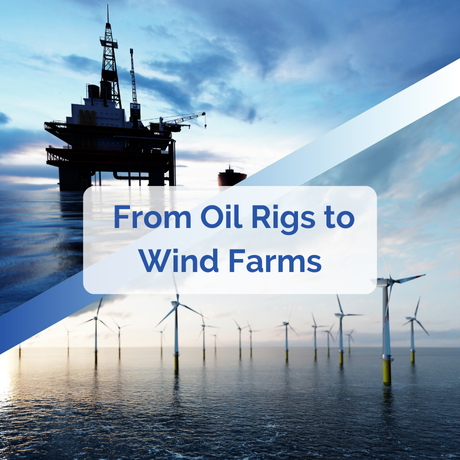
From Oil Rigs to Wind Farms
Our Global Business Development Manager, Paul Burns, talks about building on existing skillsets from the oil and gas sector and adapting to the needs of a transitioning offshore energy industry.
A Global Shift to Green Energy
The history of FoundOcean dates back to the 1960s, when we primarily provided our grouting services to the oil and gas industry, so we have seen the offshore energy sector change considerably over the years. Most significantly, the shift towards renewables has made a huge difference to the projects we take on and the wider landscape of our industry. Our projects are increasingly focused on offshore wind, even more so since joining the Venterra Group in 2021, a group of businesses dedicated to helping wind power grow. Sharing expertise with our colleagues in the group has been invaluable to working in a transitioning energy sector.
There were two important markers of this change. The first was the Kyoto Protocol in 1997, which was a global commitment to reduce emissions. Several years later, in 2015, came the Paris Agreement, a legally-binding United Nations international treaty on climate change, adopted by 196 nations across the world, with a target to “limit the temperature increase to 1.5°C above pre-industrial levels.”
(President Trump has now signed an Executive Order to begin the process of withdrawing the United States from the Paris Agreement. The USA is the only nation to have withdrawn from the Paris deal and joins Iran, Libya and Yemen as the countries outside the agreement.)
Increasingly, countries are bringing renewable sources – offshore and onshore wind, solar, hydro and nuclear power – into their energy mix, gradually decreasing their reliance on oil and gas. Early adopters of offshore wind were in northern Europe, primarily Denmark, the UK, Germany and the Netherlands, who have been making the most of high winds in the North Sea to harness electricity since the 1990s. The world’s first commercial offshore wind farm, Vindeby in Denmark, was commissioned by Ørsted in 1991, and triggered a huge wave of momentum for new wind farm infrastructure across the globe.
From Oil and Gas to Offshore Wind – Leveraging our Expertise
For FoundOcean, there was actually very little change in our service offering – grouting the foundations of wind turbines is not hugely different to grouting the foundations of oil platforms. That said, monopile and suction bucket (caisson) foundations are increasingly popular for wind turbines, along with the more traditional jacket foundations from O&G, with various factors determining which type is used by developers. However, industry-wide, there are a growing number of jobs created by the offshore wind sector, covering all aspects of the end-to end process, from engineering and installation to maintenance and operations. This has created a huge opportunity for growth and many job opportunities.
Research commissioned by Offshore Energies UK (OEUK) shows that 90% of oil and gas industry workers have skills which can be transferred to offshore jobs in renewable energy. At the beginning of this year, OEUK and RenewableUK, supported by the UK and Scottish Governments, launched the first stage of the Energy Skills Passport scheme, allowing workers to find out about transferable skills and qualifications to move from oil and gas to wind.
Jane Cooper, RenewableUK’s Executive Director of Offshore Wind, says, “More than a hundred thousand people will be working in the UK’s offshore wind industry by 2030, mostly in highly skilled roles. To grow our world-class industry as fast as possible, we need the valuable experience that oil and gas workers can bring.”
At FoundOcean, our expertise in offshore energy has allowed us to grow, more than doubling our headcount in a two-year period. Our offshore teams have been incredibly busy and our work is taking us further and further afield – last year we opened a new equipment base in Taiwan. As new opportunities arise, our work continues to be varied and interesting. Recently, we’ve even had enquiries about using our skillset for green hydrogen and carbon capture projects, so there are even more new and exciting changes ahead.
Oil and Gas Decommissioning
Another way the changing energy sector is affecting the work we do is the increasing demand for the decommissioning of oil and gas fields. These usually come to the end of their lifespans after a few decades, at which point they need to be decommissioned, safely and in a way which will have minimal impact on marine life.
One of our biggest and most memorable decommissioning projects was Brent Bravo in 2017, part of the Brent Field in the North Sea, one of the largest oil and gas fields in the UK, in production between 1976 and 2006. It was a major collaboration of a number of contractors and we were delighted to be part of such a well-executed project.
OEUK’s Offshore Decommissioning Report (2024) highlights substantial growth in decommissioning activities in the UK, primarily in the North Sea, forecasting expenditure of £24.6 billion by 2033, so this will certainly be an area of continued work and investment for the next several years.
Conclusion
It’s important to acknowledge the vital role that the oil and gas sector still plays during the transition to offshore wind and other renewables. In a period of change, energy expertise is necessary for bridging the gap between traditional offshore energy sources and the growing offshore wind sector. Those with experience in offshore operations are in a prime position to shape the future of sustainable energy.
Now is also a great time to join the industry with opportunities to grow an interesting engineering career and play a role in the rise of renewables – keep an eye out for opportunities at FoundOcean on the Careers page of our website. Whether you are a seasoned offshore professional or looking to enter the sector, now is the time to be part of this transformation.
For more information on FoundOcean’s experience and capabilities, contact the team on +44 1506 440330 or email info@foundocean.com